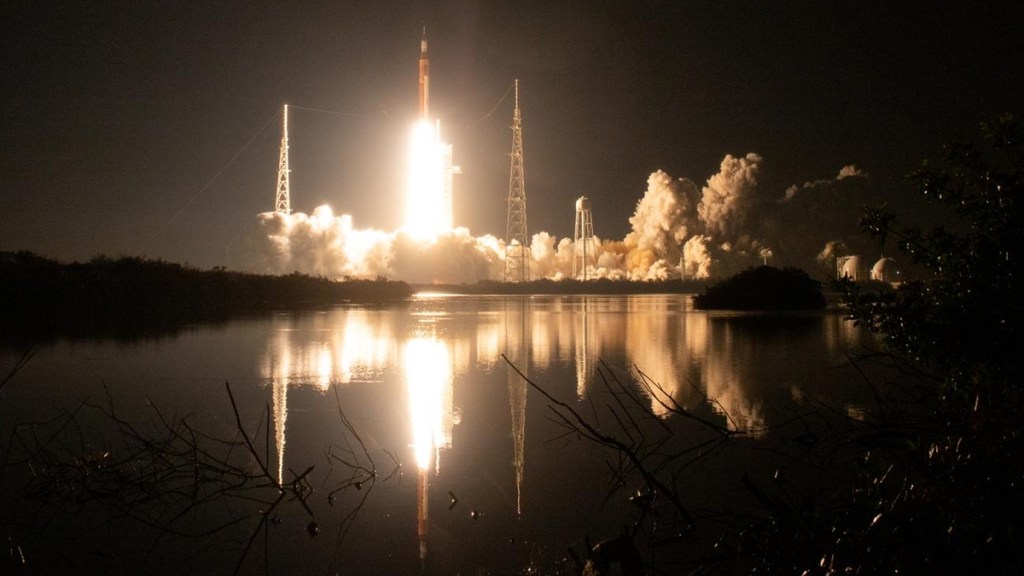Should your portfolio give some space to space stocks? Investors are now exploring space as a new frontier for investment opportunities, expanding their portfolios to include exposure beyond Earth. Of late, news of a new rocket being tested, a new satellite being launched, or a robotic research expedition successfully landing on the moon is becoming more common these days. Some companies are exploring the possibility of commercializing space flights and envisioning a human society living on planets like Mars.
Mckinsey estimates that the global space economy will be worth $1.8 trillion by 2035 (accounting for inflation), up from $630 billion in 2023. The Space Economy is defined by OECD as the full range of activities and the use of resources that create value and benefits to human beings in the course of exploring, researching, understanding, managing, and utilising space.
NASA’s drive to push forward the exploration of the last frontier through missions to the moon, Mars, and deep space has led to the invention of scores of innovative technologies over the decades. NASA is allowing the commercial industry to develop, own, and operate space systems, while the government purchases services for its science and research requirements. Companies in the space industry can, therefore, employ the same services for completely commercial space activities.
Start-ups and Small and Medium-sized Enterprises (SME) which have internationalisation ambitions and are developing products or services for the upstream or downstream space sector are perfectly seated to maximise their objectives in such an environment.
“The space industry has emerged as one of the most promising sectors in 2024, primarily thanks to SpaceX’s accomplishments. In 2023, the company broke the record for the most successful space mission with 96 and did it at a far lower cost than NASA ever did, catapulting the demand for space stocks. Although SpaceX isn’t a publicly traded company, they have contributed to the performance of space stocks in the market,” says Joel Lim, Financial analyst at Trading.biz.
Space stocks are primarily value stocks and investors should keep a close watch on space stocks that have the potential to to capitalize on the space industry’s hot trend.
Financial analyst at Trading.biz, Joel Lim, has identified two space stocks – Boeing and Virgin Galactic Holdings.
Boeing
Boeing has played an enormous role in American military history, making them an obvious choice for promising space stocks to buy. The company operates the joint venture United Launch Alliance (ULA) with Lockheed Martin, an aerospace and security giant. While ULA is yet to go public, its prospects are undeniable.
For example, ULA will be responsible for launching the majority of Amazon’s Kuiper satellite constellation project. The company is expected to send 3,236 satellites into Earth’s orbit to establish global broadband access.
Beyond its ULA involvement, Boeing continues to post impressive numbers.
Virgin Galactic Holdings
Not many companies are attempting what Virgin Galactic Holdings is: commercializing space travel. Instead of launching satellites and other inanimate objects into space, the company is piloting passenger space flights and has completed eleven of them so far. As regards potential, not many have more than it does.
Furthermore, the company had announced plans to launch Galactic 07 on June 8th, its second spaceflight this year and 12th overall. There’s an expectation that its stock value could increase after the launch, which would be perfect considering that it hasn’t done too well this year. Virgin Galactic Holdings is a different kind of space company, which makes it an exciting bet in the market. It has a first-mover advantage in the commercial space flight industry and could become a highly valuable company in the near future.
Disclaimer: Views, recommendations, and opinions expressed are personal and do not reflect the official position or policy of FinancialExpress.com. Readers are advised to consult qualified financial advisors before making any investment decision. Reproducing this content without permission is prohibited.
